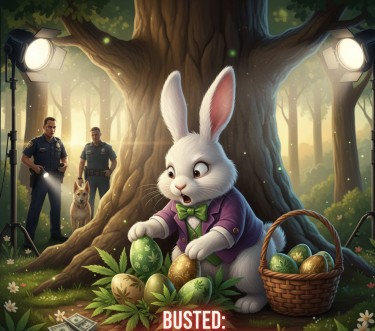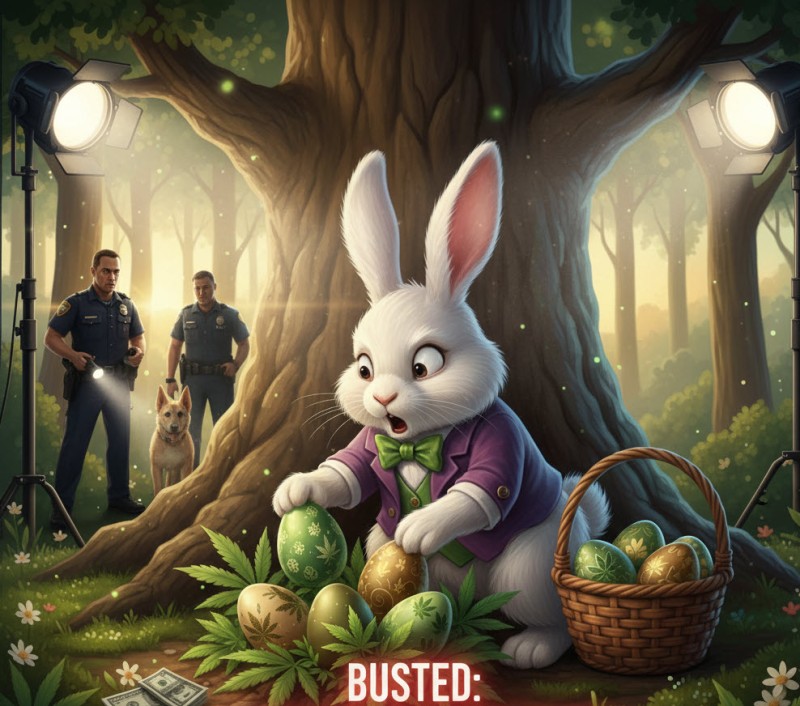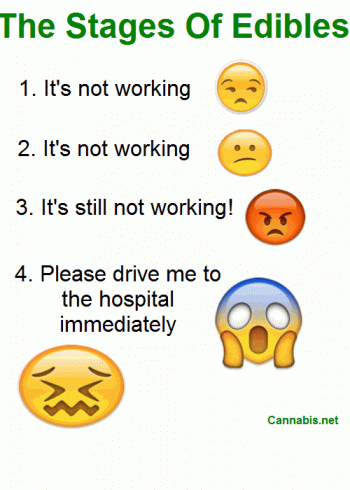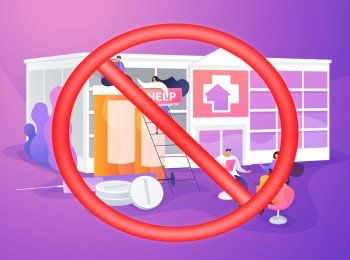
The Nug Bunny's Fall: When Cannabis Activism Meets Reality
Well, well, well. Remember our friend from Lufkin, Texas – the one I dubbed the "Nug Bunny" back during April's 420 celebrations? The guy who thought it would be brilliant to hide marijuana-filled Easter eggs around public parks and then broadcast his location on social media like some kind of stoned treasure hunt?
Yeah, that guy finally got caught.
But here's the twist that makes this story even more perfect: Avante Nicholson wasn't even busted for his Easter egg escapades. According to KETK News, police were actually looking for someone else entirely when they stumbled upon our amateur cannabis Santa Claus. It's like the universe decided to deliver its own Easter egg – a perfectly wrapped lesson in "play stupid games, win stupid prizes."
The irony is so thick you could smoke it. After months of evading capture for what was probably the most documented cannabis crime in East Texas history, Nicholson gets nabbed in a completely unrelated incident. It's like getting away with robbing a bank only to get arrested for jaywalking on your way to celebrate.
But this story isn't just about one misguided individual's poor decision-making skills. It's a perfect microcosm of where cannabis activism finds itself in 2025 – caught between the lingering romance of prohibition-era rebellion and the sobering realities of a world where cannabis is increasingly legal but still federally prohibited, increasingly accepted but still culturally divisive.
The Nug Bunny saga represents everything wrong with how some people approach cannabis advocacy in the modern era. We're no longer fighting a purely underground war against total prohibition. We're navigating a complex landscape where the rules are different in every jurisdiction, where public perception matters more than ever, and where every boneheaded stunt like this one gives ammunition to the forces trying to roll back the progress we've made.
So let's dive into what happened to our wayward Easter activist, what it tells us about the current state of cannabis advocacy, and why stories like this might actually be more important than we think in understanding where the movement goes from here.
Caught by Accident: The Universe's Sense of Humor
The arrest of Avante Nicholson reads like a script written by the universe's comedy department. After months of being "actively sought" by Lufkin police for his Easter egg cannabis distribution scheme, our would-be Nug Bunny finally got pinched – but not for the crime that made him locally infamous.
According to the report, police were conducting an unrelated investigation, looking for a completely different person, when they encountered Nicholson. It's the kind of accidental arrest that makes you wonder if there's some cosmic force that ensures all the universe's outstanding business eventually gets settled, one way or another.
Think about the absurdity of this situation. Nicholson managed to evade capture for what was essentially the most publicly documented cannabis crime in recent East Texas memory. He literally posted photos and clues on social media, created a treasure map of marijuana locations, and then disappeared into the ether when police came looking. For months, he was probably feeling pretty clever about his great escape.
Then boom – wrong place, wrong time, and suddenly all that careful evasion becomes meaningless. It's like the criminal equivalent of getting a parking ticket while successfully hiding from the FBI.
But here's what makes this story even more fascinating from a cannabis advocacy perspective: Nicholson's original crime was both completely avoidable and utterly predictable. Every experienced cannabis advocate could have told you exactly how this would end. You don't hide drugs in public parks where children play. You don't broadcast your illegal activities on social media. And you definitely don't combine those two mistakes while living in East Texas.
The fact that it took months to catch him suggests either that Lufkin PD wasn't making this their top priority, or that Nicholson was better at hiding than he was at planning. Either way, his accidental arrest feels like the universe's way of providing closure to a story that had been hanging in the balance.
From a broader perspective, this arrest represents the end of what might be the most perfectly symbolic cannabis advocacy failure of the social media era. Nicholson managed to combine the worst aspects of prohibition-era rebelliousness with modern digital oversharing, creating a perfect storm of poor decision-making that hurt both his own interests and the broader cause of cannabis normalization.
His original Easter egg stunt played directly into anti-cannabis stereotypes about irresponsible users who don't care about community safety or children's welfare. The months-long manhunt that followed reinforced images of cannabis users as criminals evading justice. And now his accidental capture completes the narrative arc with a perfectly mundane ending that strips away any romantic notions about outsmarting the system.
In many ways, Nicholson's story represents everything that modern cannabis advocacy should avoid. We're no longer in an era where any publicity is good publicity, where rebellious stunts automatically advance the cause, or where breaking the law in creative ways somehow helps normalize cannabis use. We're in an era where every action reflects on the entire community, and where responsible advocacy requires thinking beyond individual self-expression.
The Lessons We Should Have Already Learned"
The Nug Bunny saga should never have happened in the first place, not because cannabis Easter egg hunts are inherently wrong, but because we've already learned these lessons the hard way. The cannabis advocacy movement has decades of experience showing us exactly what works and what backfires spectacularly.
Let's start with the obvious: public safety comes first, always. This isn't some compromise with prohibitionists or kowtowing to conservative sensibilities – it's basic human decency. Every successful cannabis advocacy campaign has understood that protecting children and maintaining community safety are non-negotiable priorities. When you hide drugs in public parks, you're not advancing cannabis rights; you're handing opponents a perfectly gift-wrapped argument against legalization.
The social media element makes this even more problematic. We've watched countless cannabis activists destroy their own causes by documenting illegal activities online. From Instagram growers getting raided to dealers advertising on Snapchat, the pattern is always the same: digital evidence becomes prosecutorial gold. Nicholson's Facebook posts didn't just incriminate him personally; they created a permanent record that opponents can use to argue that cannabis users are fundamentally irresponsible.
But the deeper issue here is the misunderstanding of what modern cannabis advocacy actually requires. We're not in 1960s counterculture territory anymore, where breaking laws automatically challenges unjust systems. We're in a complex legal landscape where cannabis is legal in some places, illegal in others, and federally prohibited everywhere. Navigation requires strategy, not stunts.
The most successful cannabis advocates today understand that normalization happens through demonstration of responsibility, not rebellion. When soccer moms see cannabis users as responsible parents who happen to consume a legal substance, that advances the cause. When business leaders see cannabis entrepreneurs as legitimate members of the community, that builds support. When law enforcement sees cannabis users following rules and respecting boundaries, that reduces opposition.
Nicholson's approach accomplished the opposite of all these goals. Instead of normalizing cannabis use, he reinforced stereotypes. Instead of building community support, he created opposition. Instead of demonstrating responsibility, he showcased recklessness.
The timing of his stunt also shows a fundamental misunderstanding of the current political moment. Cannabis legalization isn't inevitable – it's facing real pushback in many states and at the federal level. Public opinion, while generally supportive, can shift quickly when opponents find compelling examples of cannabis-related problems. Every irresponsible action provides ammunition for those trying to roll back progress.
What's particularly frustrating is that responsible cannabis Easter celebrations already exist. In legal states, licensed consumption lounges host adult-only cannabis egg hunts with clear safety protocols and age verification. These events build community, normalize responsible use, and demonstrate that cannabis culture can be both fun and safe.
The path forward for cannabis advocacy isn't mysterious or complicated. It requires treating cannabis like what it is in most places: a legal or quasi-legal adult product that deserves the same respect and responsibility as alcohol. It means focusing on harm reduction, community safety, and responsible use rather than prohibition-era rebellion fantasies.
Every time someone pulls a Nug Bunny-style stunt, they're not just risking their own freedom – they're potentially setting back progress for millions of cannabis users who are trying to live normal, legal lives.
From Nug Bunny to Cautionary Tale
The arrest of Avante Nicholson closes the book on what might be 2024's most perfectly instructive cannabis advocacy failure. What started as a misguided attempt at holiday humor has become a textbook example of how not to advance cannabis normalization in the modern era.
But here's the thing about cautionary tales – they're only valuable if people actually learn from them. Nicholson's story should be required reading for anyone who thinks cannabis advocacy is still about breaking rules and challenging authority through dramatic gestures. Those days are over, if they ever really existed.
We're living in a time when cannabis policy is being written in real-time, when public opinion is still forming, and when every action by cannabis users gets scrutinized and amplified. The stakes are too high for amateur hour stunts that endanger children and reinforce negative stereotypes.
The universe's sense of humor in delivering Nicholson's accidental arrest feels like poetic justice, but the real justice would be if his story prevents others from making similar mistakes. Cannabis advocacy doesn't need more Nug Bunnies hiding drugs in public parks. It needs responsible adults demonstrating that cannabis users can be trusted members of their communities.
As we move forward with legalization efforts across the country, let's remember that every action reflects on all of us. The Nug Bunny's fall from Easter prankster to cautionary tale should remind us that in the fight for cannabis freedom, responsibility isn't the enemy of rebellion – it's the path to victory.
Sometimes the best way to honor a plant's potential is to treat it, and the communities we live in, with respect.







